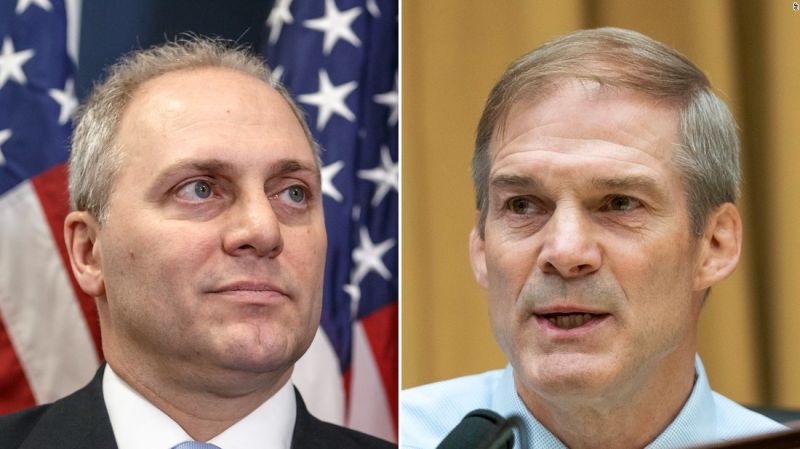House Republicans gathered for the first time since last week’s historic vote to oust Kevin McCarthy, but the two-hour session left them no closer toward coalescing around a speaker nominee and a path forward as they debate potential rules changes and grapple with the raw feelings lingering after the unprecedented events of last week.
While the impetus on Republicans to pick a new speaker escalated after the terrorist attack in Israel over the weekend, the House GOP conference remains bitterly divided over how it should proceed – and who can get the 217 votes needed to lead it.
Republicans are preparing for the prospect that neither House Majority Leader Steve Scalise of Louisiana nor House Judiciary Chairman Jim Jordan of Ohio can get the votes to be elected speaker, leaving the conference with no clear path forward. They’re also divided over the rules that the conference will use to elect a new speaker – while hoping to avoid the embarrassment of the 15-vote marathon that played out for McCarthy in January.
“The House needs to get back to work, and that means we’ve got to select the speaker, and you saw strong resolve to make sure that we can come together quickly (to) get our speaker elected,” Scalise told reporters following a marathon two-hour conference meeting Monday evening.
House Republicans are slated to hear again from Scalise and Jordan on Tuesday evening for a candidate forum, but it’s unlikely that another meeting will solve the conference’s simmering issues.
The Monday session also gave lawmakers the chance to vent about the eight Republicans who voted to oust McCarthy and left the House speakerless. GOP lawmakers made clear their emotions are still raw, and it will take ample time to find consensus after the unprecedented events of last week.
Rep. Derrick Van Orden of Wisconsin told CNN he wasn’t ready to back a candidate. “I’m not backing anyone, until we deal with the fact that we have people in our conference who could shut this House down on a whim again,” he said.
GOP Rep. Max Miller of Ohio called for an extra week for the House GOP to coalesce around a nominee for speaker and said that people in the room were “broken” while leaving the closed-door meeting Monday night.
Rep. Steve Womack of Arkansas, a senior GOP appropriator, likened the conference to a “scattergram.”
“Pretty good discussion, a lot of opinions; we’re kind of like a scattergram – we’re all over the map in terms of the way forward,” Womack said. “Some of it about rules changes, some of it about, you know, hard feelings about what happened on Tuesday and wanting to go back and revisit that.”
Neither Scalise nor Jordan spoke at the meeting. McCarthy, who on Monday would not rule out that he could be renominated to be speaker if no consensus can be found, did not attend.
But some of the Republicans who voted out McCarthy made clear Monday they aren’t backing down. Rep. Cory Mills, a Florida Republican backing Jordan, shot down the idea that McCarthy could emerge.
“One of the things that we discussed today is the only people who can actually be considered (are) those who’ve already announced their nomination,” he said.
In addition to the race between Scalise and Jordan, the conference is also divided over how the speaker nomination process would work, which would have major implications for who would be able to prevail.
A proposal, drafted by Rep. Chip Roy of Texas, would require a lawmaker to secure a majority of the entire House – not just a majority of their conference – to secure the party’s nomination for speaker, a key change intended to ensure the nominee has the necessary support before they move to a floor vote.
Jordan and many of his allies are backing the proposal. But Scalise allies, who believe he can secure a majority of the conference but acknowledge he won’t get 217 votes on the first ballot, are against the move.
In some corners of the conference, there was a push to quickly settle on a speaker. House Foreign Affairs Chairman Mike McCaul called for a new speaker by Wednesday to avoid appearances of weakness and dysfunction amid war in Israel.
Until a new speaker is selected, the House can’t pass legislation to address the crisis, McCaul noted.
“We need to get a speaker by Wednesday, and the first bill on the floor is going to be my resolution condemning Hamas for these terrorist attacks in Israel,” he said.
Read the full article here





